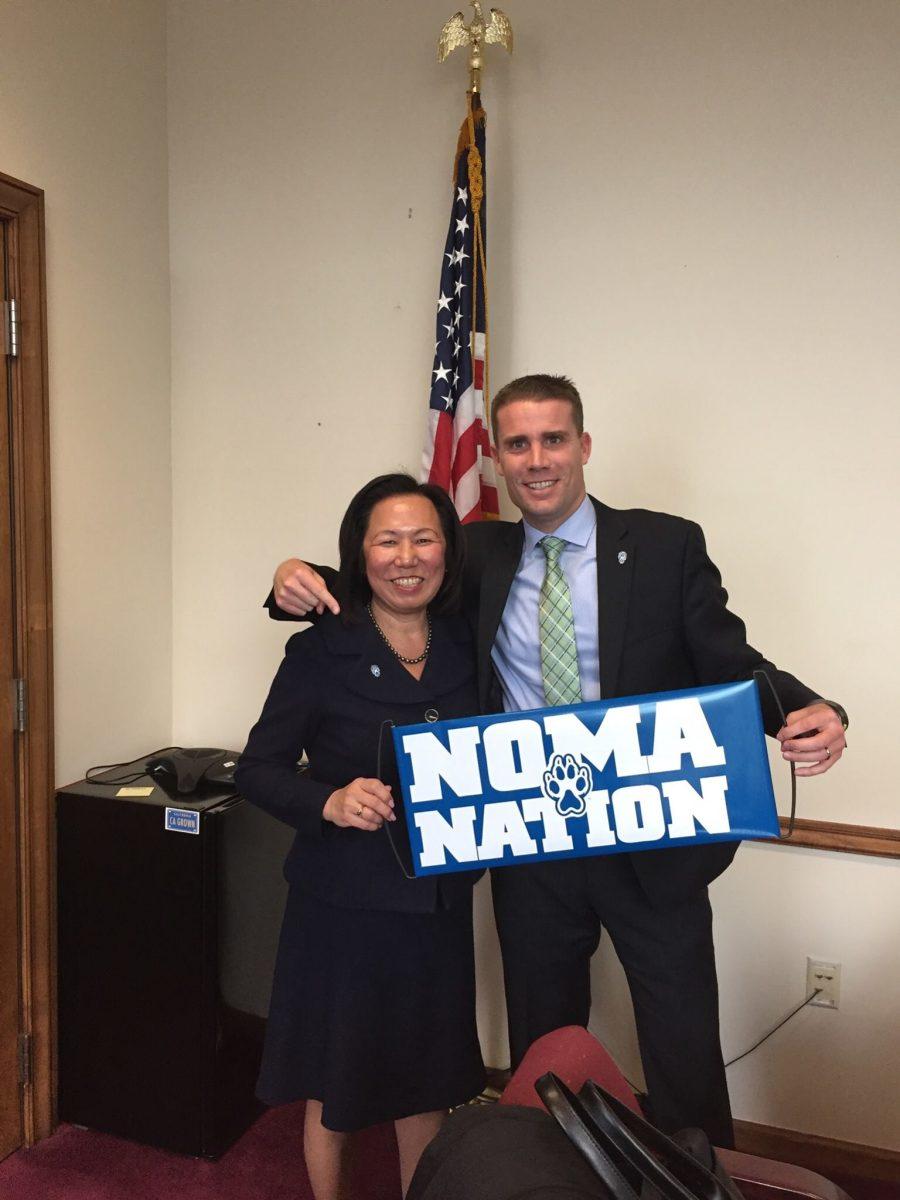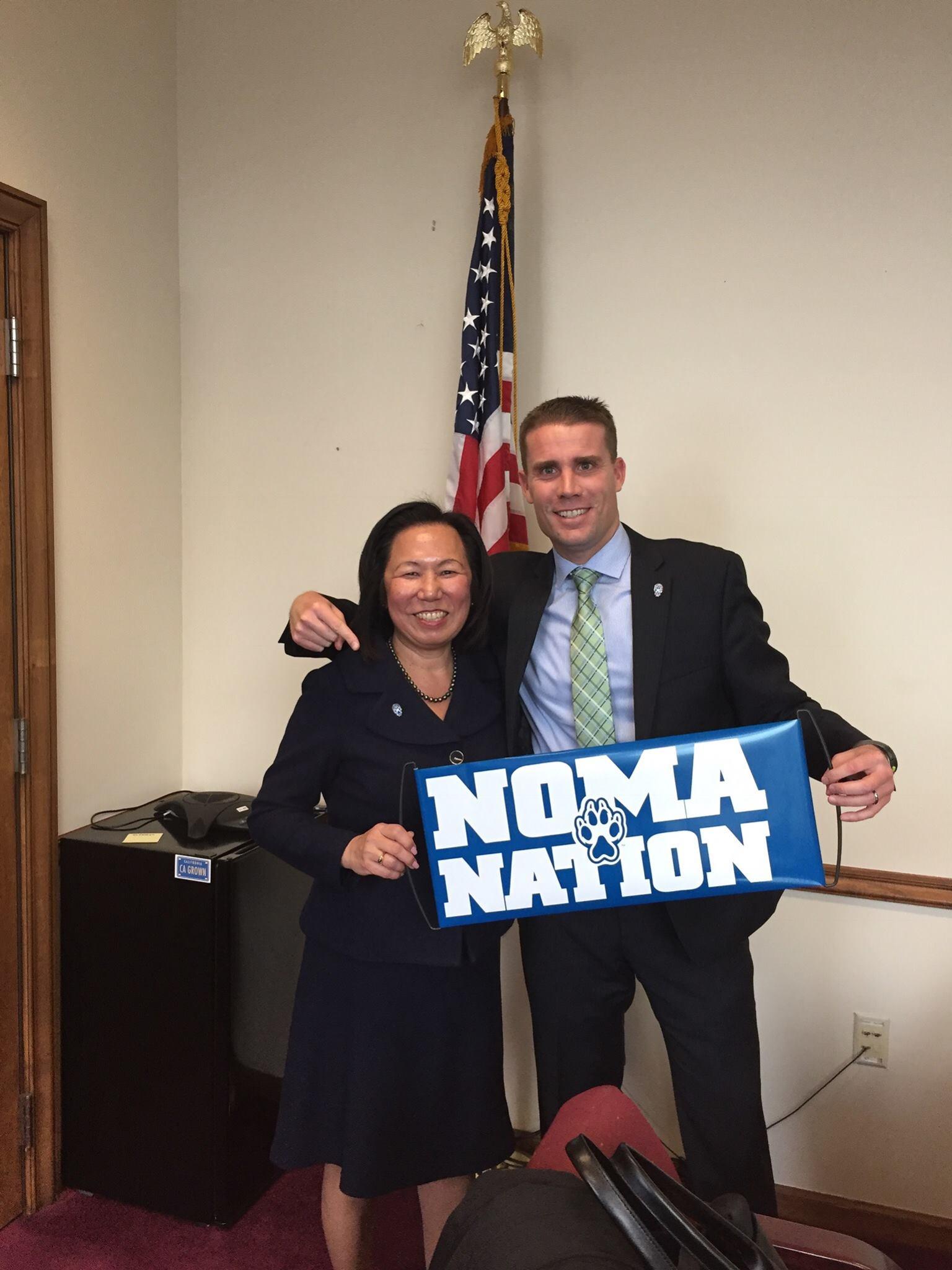President Donald Trump’s signing of an executive order to ban immigration from seven countries, and his earlier crackdown on undocumented residents has cast uncertainty on the future and well-being of Muslim, Latino and Latina citizens in the U.S., including those who attend Sonoma State University.
In a statement issued Jan. 31 via email, Sonoma State President Judy Sakaki announced her support for undocumented and immigrant students, stressing the importance of being “One Noma Nation.”
Sakaki said in the statement that Sonoma State, unless required by law, will not question or arrest anyone on the basis or suspicion of being an undocumented immigrant, and that the university will defend educational opportunities for the students targeted in Trump’s executive orders.
Daniel Malpica, associate professor and chair of the Chicano and Latino studies department, said he admires the leadership Sakaki showed in this statement.
He said he took particular note of her refusal to question or detain potential immigrants and her admitting how many members of the Sonoma State community are immigrants or children of immigrants.
“I think that’s very, very powerful, to convey to the students that are being affected that we get the sort of dilemmas that they’re confronted with, and that we’re all in this together,” Malpica said.
Sakaki’s statement linked to a separate joint statement made by California State University Chancellor Timothy White and every CSU president, including Sakaki.
The joint statement opposed Trump’s executive order and asked President Donald Trump to reconsider the order’s “divisiveness.”
Mariana Martinez, research coordinator for the McNair Scholars Program, said it is important to humanize students who use DACA’s services, despite “negative labels” associated with these students.
“[Sakaki] has amazing students that are DACA,” Martinez said. “We have students who are getting admitted to Ph.D. programs to Penn State, University of Illinois… so it’s not like these kids are leeching off the system.”
Sakaki said she and other presidents voiced their support for the recently proposed BRIDGE Act. According to the National Immigration Law Center, the BRIDGE Act would allow people with temporary protection from deportation under DACA to stay in the U.S. with the federal government’s permission.
Malpica said it is important for Sonoma State to support DACA students, many of whom have “so much to contribute to everybody.” He said that two of his past students who rely on DACA are getting their master’s degrees at the University of Texas at Austin.
“I can assure you that once they’re done with their master’s degree, they will do remarkable things, because they’re good at what they do,” Malpica said. “They’re well-trained, are committed to their area of specialization, and I think that’s what we need to do as an institution of higher learning—really support, train and educate all students, regardless of their color, regardless of their legal status.”
Malpica said it is important for Sonoma State to support DACA students.
Malpica said he thinks Sonoma State should strive for more on-campus diversity. He suggested that the institution hire more staff and faculty of color, and promote the hardest working ones to higher-ranking leadership positions.
He also said Sonoma State should show “institutional support” to undocumented students and students of color, ideally attracting a more diverse student body going forward.
“Sonoma State should mirror the demographics of California, and at this point, that’s not the case,” Malpica said.
Lauren Morimoto, kinesiology professor and director of diversity and inclusive excellence, said she thinks Sonoma State doesn’t do enough “active recruiting” of students in diverse areas outside of Sonoma County, such as Vallejo.
Morimoto, who previously wrote administration suggesting they put out a statement on Trump’s executive orders, said she liked the message of Sakaki’s statement, but “would have liked some stronger language” to make students feel more protected. She said she would like to see Sonoma State declare itself a sanctuary campus, but doesn’t think the CSU system would likely go that far.
“Even if it becomes an issue where we battle with the chancellor’s office, I think it’s an important thing to say,” Morimoto said.
Despite her thoughts on the wording of Sakaki’s statement, Morimoto said she appreciated the quick response, Sakaki’s defense of DACA, and the inclusion of links to supportive and diversity-friendly resources on campus.
Carly Solberg, student assistant at the HUB and Queer-Straight Alliance president, said she felt Sakaki reached out to students “in a very personal way” through her statement.
“I think that there’s always things that [administrators] could do better,” Solberg said, “But as a university in California, I feel extremely lucky to have these people banding together as Californians to protect their students.”
Solberg said she would like to see more representation of other identities at Sonoma State, such as openly queer, and would like to see identity-based student organizations, such as the Queer-Straight Alliance and the Undocu-Scholars Coalition, collaborate more often.
“I do think that we need to do more in bringing our groups together,” Solberg said. “Whether that be through events, fundraising or volunteering together, that would be a good idea.”
Morimoto, though she said she might be hoping for “a statement that can’t be written,” explained how she would have worded a statement to students in uncertain political times.
“We get that a lot of you feel under siege — faculty, staff and students — and we are here,” Morimoto said. “This is going to be your space. So whatever stuff is going on out there, we want you to know that this is your space, no matter what.”





![[Both photos courtesy of sonoma.edu]
Ming-Ting Mike Lee stepped in as the new SSU president following Sakakis resignation in July 2022](https://sonomastatestar.com/wp-content/uploads/2024/04/CC4520AB-22A7-41B2-9F6F-2A2D5F76A28C-1200x1200.jpeg)



























